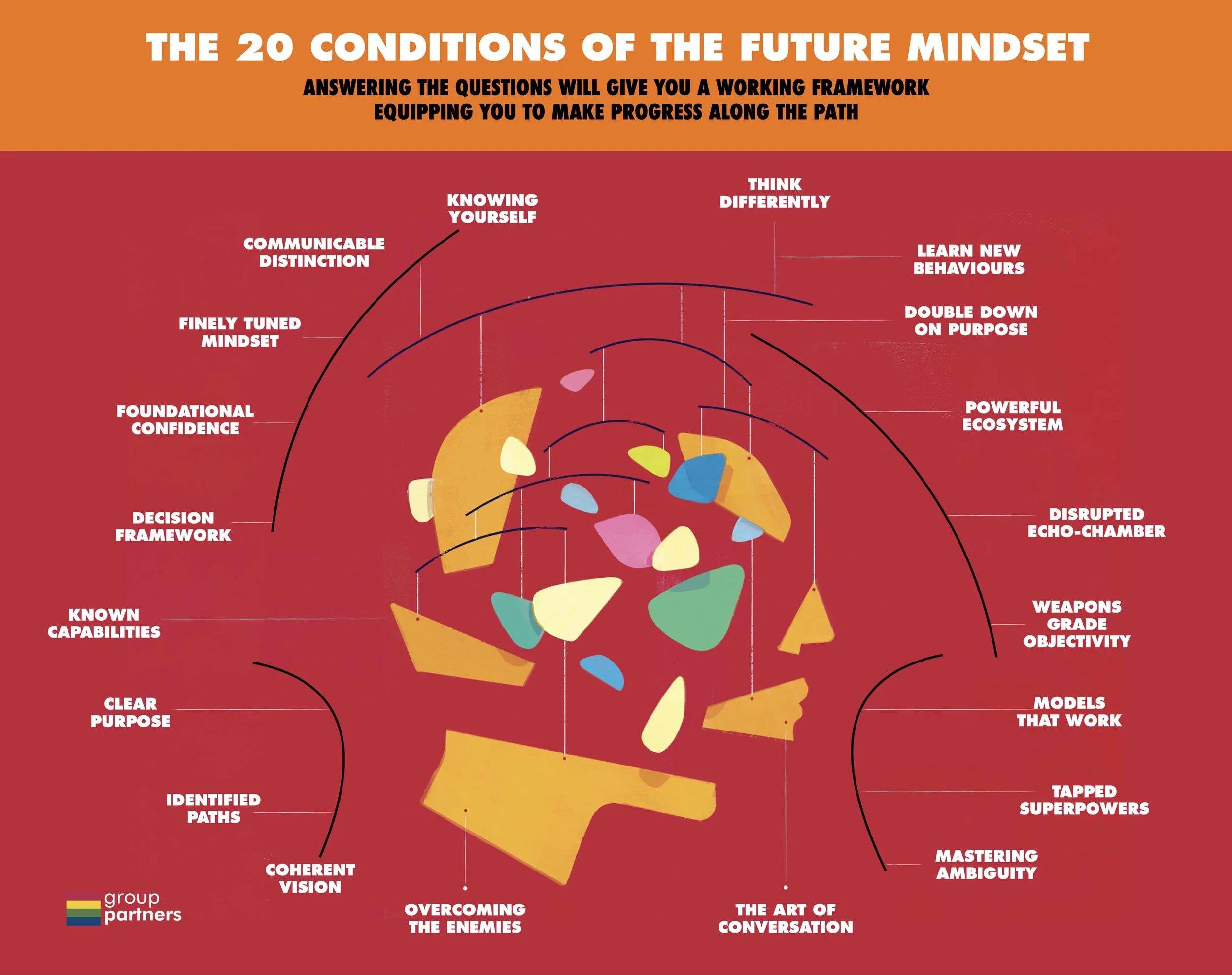WELCOME TO THE FUTURE
THE SECOND TEN
THE SECOND 10 OF THE SET OF 20 KILLER QUESTIONS
THE SECOND 10 OF THE SET OF 20 KILLER QUESTIONS
As you answer - contrast them with your earlier answers.
Answer them in the same role/persona you chose for the first ten - YOU, YOUR project or YOUR company.
Completing the 20 will help you prepare a firmer foundation upon which to build your future.
Have your earlier answers to hand.
Try to write down your insights as you make progress.
Iteration is good.
Once again, there’s no prize for answering them quickly - only honestly.
QUESTION ONE:

You’re where you are because of the decisions you’ve made and the situations you’ve experienced. They formed you. You may not like the thing you would want to change but it does define you.
Have you given yourself the time and space to change this aspect of yourself?
Has it become so convenient and familiar that you would miss it if it weren’t there?
Could you think differently enough about it to turn it to your advantage?
QUESTION TWO:

Most of us have moments where it might be better to be more like someone else?
Can you imagine growing this new quality for yourself?
What would you do differently if you had it?
Is there anything stopping you working to achieve it? What?
QUESTION THREE:

We’re always going through ‘emergence’. We inch and nudge ourselves towards our purpose. But the world is exponential. We need to be prepared for the warp speed and adjust our pace and rate accordingly.
Are you happy with your progress?
How do you measure good? Is that good enough for where you want to be?
What would supercharge progress?
QUESTION FOUR:

The enemy is often hanging out as an insidious systemic problem. It’s many problems wrapped within other problems and masquerading as something else. That’s why it’s often called a wicked problem.
Are sure you are tackling the root cause, not the effect?
Have you explained the ‘enemies’ broadly and coherently enough to others - those that might help you defeat them?
Are you applying similar approaches to the solutions that may have created them in the first place?
QUESTION FIVE:

We become comfortable in the world we’ve created. It’s often a trap - and one that slowly ensnares us. If we are comfortable then we’re not moving the needle in new worlds that would make us more successful.
Are you talking to the ‘already converted’ too often? Limiting your potential?
By shifting our gaze would be more likely to learn more and identify better insights and opportunities?
Can you broaden your reach (and impact) by moving outside your comfort zone? (Taking more risks)
QUESTION SIX:

A majority of the leaders I’ve known lead lonely lives. Even though they have many connections they seldom get told the truth. Subconsciously they will worry that it’s all going to blow up in their face.
Do you encourage challenges to your own conceptions, conventions, plans and strategies?
Are you open/able to accept criticism of these long-held metaphors and constructs?
Would you miss your narrative if you were convinced to change it?
QUESTION SEVEN:

There are more dynamic change and shifts happening in the world nowadays than any human plan can deal with.
Can you imagine creating a plan for preparedness - a plan with built-in/multiple points of pivot?
Should you pay more attention to the subtle shifts and build a more aggregate sense of what they express?
Do you think you can hang on to the vision but accept and embrace the practical waypoints at the same time?
QUESTION EIGHT:

You already are a brand - there’s no choice in the matter. The only question is how capable (and how fast) you can leverage the skills you need to make it work for you in the new world. Or be prepared and happy to remain a secret.
Are you capable of exploiting the superpower of communication - building a meaningful individual and business brand?
Writing the narrative and packaging your ‘product’ and solution is non-negotiable if you expect to exist in any market. Even if you only self your solution at dinner parties.
Can you stand back far enough to see the terrain that would mark out your position and the unique agency you have to succeed?
QUESTION NINE:

Creating a plan requires all the moving parts to be in place one way or another. In these times of drastic change, it’s pretty certain there’s more than one way to make that happen.
Are you good at partnering with others to help you get to your vision?
Can you motivate and empower those in your team or ecosystem to step up?
Have you exhausted all the new models, approaches, systems, techniques and mechanisms to leverage your ideas and mission?
QUESTION TEN:

They are, after all, merely a framework that a conscious and determined leader will be considering (to one degree or another) all of the time.
If clarified then the clues are there as to what’s to be done. You can get to work on the stuff that matters.
If confused then the clues are there as to what’s to be done - albeit with some help. You can get to work on the stuff that matters.
Either way, I’m happy to talk.

If you feel further tests are your thing try the Group Partners assessment below.
This should help you and your business think things through as we try to emerge from the chaos of 2020.
The Strategic Coherence test was designed for business leaders to see how prepared their existing business is for the uncertain future.